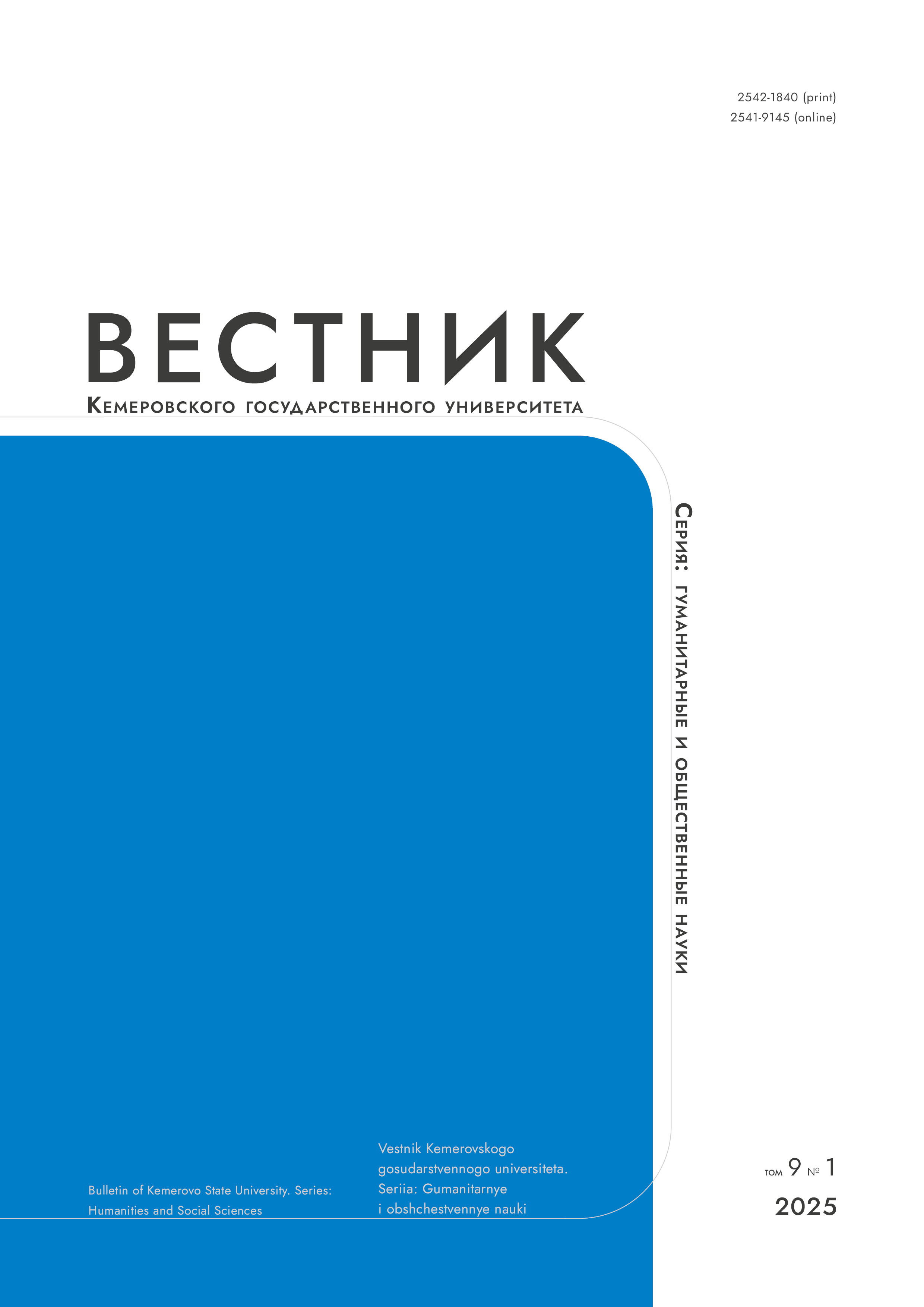Kemerovo, Russian Federation
UDC 37
The article introduces a new model for developing volitional self-direction skills in students of orphanage schools. The research objective was to identify and describe the components of this model. The paper explains the essence of the self-direction process and the specifics of self-direction development in adolescents. The problem of developing self-direction in orphans still remains understudied. The authors proved that volitional self-direction skills develop in orphans in the environment where they live and study. They defined the concept of developing volitional self-direction skills in orphanages as a continuous, purposeful, and controlled interaction between teachers and students, aimed at developing a system of knowledge and ideas about the volitional regulation of students’ activities, as well as acceptable ways of reacting and behavioral patterns in various situations. The paper describes criteria, indicators, recommendations for assessment, and organizational conditions.
formation of volitional self-direction skills, criteria of the level of formation, indicators of the level of formation, blocks of the model of the formation process of skills, adolescence
1. Rubinstein S. L. Fundamentals of general psychology. St. Petersburg: Piter, 2001, 720. (In Russ.)
2. Zhidkova O. A. Development of police officers' abilities for emotional-volitional self-regulation at the initial stage of professional training. Psychopedagogy in Law Enforcement, 2020, 25(1): 32-36. (In Russ.) DOI:https://doi.org/10.24411/1999-6241-2020-11005
3. Nikiforov G. S., Shingayeva S. M. Types of mental self-control. Pushkin Leningrad State University Journal, 2014, 5(1): 92-101. (In Russ.)
4. Petrov Yu. N., Petrova N. S. Formation of self-control trained in the course of educational activity. Vestnik of Moscow Goryachkin Agroengineering University, 2010, (3): 109-112. (In Russ.)
5. Salikhova N. R. Constructing your own life: self-direction and self-organization. Uchenye Zapiski Kazanskogo Universiteta. Seriya Gumanitarnye Nauki, 2012, 154(6): 267-279. (In Russ.)
6. Morozova I. S., Pronin E. A. Self-regulation parameters in relation to personality traits of first year cadets a military university. The Bulletin of Irkutsk State University. Series Psychology, 2019, 29: 40-53. (In Russ.) DOI:https://doi.org/10.26516/2304-1226.2019.29.40
7. Belogay K. N., Morozova I. S., Medovikova E. A., Sakharchuk N. Yu., Tupikina G. G. Peculiarities of individual temporal perspectives of university students with various levels of self-regulation at different stages of university education. Vestnik Novosibirskogo gosudarstvennogo pedagogicheskogo universiteta, 2018, 8(5): 57-72. (In Russ.) DOI:https://doi.org/10.15293/2226-3365.1805.04
8. Grinenko D. N., Morozova I. S. Formation of self-regulation and organization of cognitive style in terms of psychological and educational support. Sibirskiy Psikhologicheskiy Zhurnal, 2017, (64): 149-157. (In Russ.) DOI:https://doi.org/10.17223/17267080/64/10
9. Grinenko D. N. The interrelation of the parameters of cognitive styles and self-regulation of the students of vocational education organizations. Vektor nauki Tolyattinskogo gosudarstvennogo universiteta. Seriya: Pedagogika, psikhologiya, 2016, (4): 39-43. (In Russ.) DOI:https://doi.org/10.18323/2221-5662-2016-4-39-43
10. Galkina V. A. The technology of forming self-control for children with mild mental retardation in the learning process. Pushkin Leningrad State University Journal, 2014, 3(4): 66-75. (In Russ.)
11. Lynda A. S. Didactic foundations of the formation of self-control in the process of students' independent educational work. Moscow: Vyssh. shk., 1979, 159. (In Russ.)
12. Sergeeva E. V. Formation of self-control and self-esteem actions in primary schoolchildren. Nachalnaia shkola plius Do i Posle, 2006, (6): 28-32. (In Russ.)
13. Borovskaia D. N. Self-control as an element of educational activity. Aktualnye problemy sotsialno-gumanitarnogo i nauchno-tekhnicheskogo znaniia, 2018, (1-2): 3-5. (In Russ.)
14. Rusakova O. V. Formation of skills and abilities of self-regulation based on reflection in younger adolescents in the learning process. Cand. Ped. Sci. Diss. Kirov, 2009, 209. (In Russ.)
15. Cherkevich E. A. The peculiarities of mental conditions self-regulation in teenagers. Omskiy nauchnyy vestnik, 2007, (2): 164-165. (In Russ.)
16. Korneeva S. A., Lokteva A. V. Psychological features of self-regulation processes in adolescents with dependent behavior. Nauchnye vedomosti Belgorodskogo gosudarstvennogo universiteta. Seriia: Gumanitarnye nauki, 2015, (24): 159-164. (In Russ.)
17. Popova S. I. Development of self-regulation in adolescents in the context of educational process. Psihologicheskaia nauka i obrazovanie, 2017, 22(6): 99-108. (In Russ.) DOI:https://doi.org/10.17759/pse.2017220609
18. Nesterov A. Yu. Specificity of the orphans' socialization process in the system of municipal boarding schools: the case of the Kemerovo region. Cand. Sociol. Sci. Diss. Moscow, 2012, 209. (In Russ.)
19. Yaroslavtseva I. V. Specificity of irregular development of a deprived adolescent. Personal Development, 2004, (4): 137-140. (In Russ.)
20. Yaroslavtseva I. V. Psychic deprivation: its origin, symptoms and mechanism of development. Sibirskiy Psikhologicheskiy Zhurnal, 2013, (47): 33-40. (In Russ.)
21. Nikolaeva E. I. Theoretical analysis and experimental solution of the problem of abandoning orphans in foster families. Teoreticheskaya i eksperimentalnaya psikhologiya, 2014, 7(4): 90-106. (In Russ.)
22. Bruk Zh. Yu., Kukhterina G. V. Structure of consciousness of youngsters deprived of parental care. Kazan pedagogical journal, 2015, (6-2): 417-420. (In Russ.)
23. Yakovlev E. V., Yakovleva N. O. Model as an outcome of education process modeling. Vestnik Cheliabinskogo gosudarstvennogo pedagogicheskogo universiteta, 2016, (9): 136-140. (In Russ.)
24. Kretsan Z. V., Morozov E. V. To the problem of modeling in modern education: prospects for model transformations and implementation risks. Vestnik Kemerovskogo gosudarstvennogo universiteta. Seriia: Gumanitarnye i obshchestvennye nauki, 2019, 3(4): 316-324. (In Russ.) DOI:https://doi.org/10.21603/2542-1840-2019-3-4-316-324
25. Morozova I. S., Timofeeva I. G. Research of volitional self-regulation in orphaned and children left without parental care in the conditions of network interaction. Professional education in Russia and abroad, 2020, (1): 97-103. (In Russ.)
26. Korepanova M. V. Organization of network interaction of preschool educational institutions and additional education institutions. Izv. Volgogr. gos. ped. un-ta, 2018, (1): 53-56. (In Russ.)


















